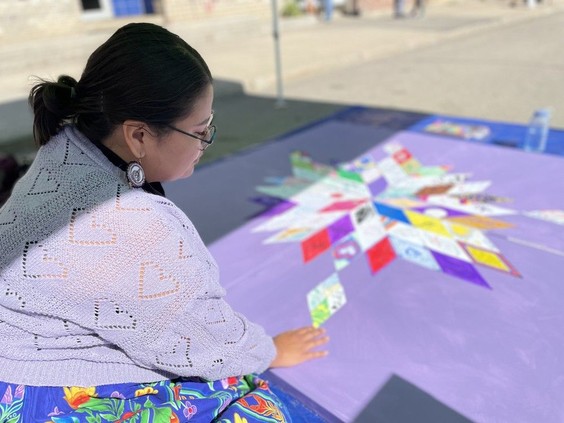
Julia Peterson
Saskatoon StarPhoenix
A bright red rose. A feather. A child’s hand outlined in blue. Dozens of names — full names, first names, nicknames, initials. Messages written on paper diamonds in careful script; in crayon scribbles:
“Forever in our hearts.” “#1 Dad.” “Brother.” “Love and miss you forever.”
Birthdays. Death days.
Laid out on purple canvas in front of Prairie Harm Reduction in Saskatoon, the community memorial star blanket filled up quickly, each diamond in the pattern paying tribute to a loved one who died from overdose.
When the International Overdose Awareness Day gathering began on Saturday morning, the plan had been to fill the canvas with 72 diamonds. Less than two hours in, organizers were quickly cutting their remaining blank tiles into quarters, so the memorial wouldn’t run out of space.
“It’s hard, as someone who has had some family history with addiction, to see so many names in such a short amount of time,” said lead artist Kamisha Alexson. “It’s eye-opening.
“But it’s empowering, too, to see how people honour those who have passed on: There’s no shame, no guilt, no anger or resentment. Just something beautiful.”
Alexson also had a diamond of her own to add, green letters on a bright yellow background tracing the name of her late auntie Inez.
“But if I knew how to draw a fitted sheet, I would’ve drawn that for her — because she’s the one who taught me how to fold one of those,” Alexson said. “And every time I fold sheets, I think of her. It’s the little things.”
When Kayla DeMong, executive director of Prairie Harm Reduction, sat down to add a diamond to the star blanket on Saturday, she had so many names and faces in her mind that she didn’t know where to begin.
“I’m remembering dozens and dozens of people: People in my personal life; people in my professional life,” she said. “Over the years, I have seen so many people lost to addictions and the lack of services available. There’s just too many: It’s not grief for a person, it’s grief for so many people, and sadness that their lives had to end that way, so often alone and abandoned by everybody.
“And in so many cases, it wasn’t necessary. If we’d had the proper resources, they would be alive, and their lives would have been so different. But instead, we are letting people die who don’t need to, and we’re losing the idea that these are human beings. More and more, they’re turning into statistics, and nobody seems to care.”
In 2024, with four months of the year remaining, the Saskatchewan Coroners Service says over 100 people in the province have died of an overdose. Last year, the province recorded nearly 400 overdose deaths in total.
But on days like this, DeMong says there is one statistic that brings her some comfort:
In 2023, nobody died at Prairie Harm Reduction. Paramedics at the safe consumption site responded to 63 overdoses and reversed every one of them without having to call for an ambulance.
“This shows the power of a safe consumption site, that we’ve had zero deaths and we haven’t had to call paramedics in,” she said. “We’re able to support people, even though we saw a significant jump in new people accessing the site last year.”
But DeMong says the work is getting harder all the time, with some politicians directly targeting safe consumption sites like Prairie Harm Reduction even as as more community members than ever are coming through the door and asking for the organization’s help.
She points to a recent set of videos posted to social media by Saskatoon West MP Brad Redekopp, in which he refers to the organization as “Prairie Harm” and calls it “a radical woke ideology treating drug addiction with more drugs,” and Conservative leader Pierre Poilievre’s recent comments referring to safe consumption sites as “drug dens.”
“In all my years, and all the politicians I’ve had to deal with — even in the most heated fights — I have never heard people say things that are so discriminatory, with such a separation of ‘us’ versus ‘them,’ ” said DeMong. “It’s hard to think that, in 2024, this is what we’re seeing and what we’re hearing from the people leading our country and our province. It feels like we’re moving back in time, not forward.”
Sitting in front of the star blanket canvas with a blank white diamond in front of her, “going back and forth between remembering all the people, and being so angry,” DeMong decided not to add any more names to the memorial this year.
Instead, she simply wrote: “Too many to count.”

